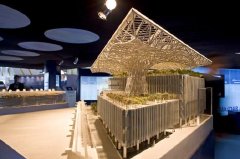Masdar and BASF today announced a strategic partnership agreement for collaboration on the construction of Masdar City, the world's first carbon-neutral and zero-waste city. BASF is named as a "preferred supplier" of construction materials and system solutions for the city's construction. The chemical company will also open an office in Masdar City once it is completed.
 Leafy roofs, lots of glass, futuristic designs built in an energy-efficient way – this is how the homes in Masdar could look. BASF’s expertise and sustainable materials can help to build the world’s first carbon neutral city.
Leafy roofs, lots of glass, futuristic designs built in an energy-efficient way – this is how the homes in Masdar could look. BASF’s expertise and sustainable materials can help to build the world’s first carbon neutral city.
In order to reduce the energy demand in Masdar City, BASF will play an integral role in the city's construction by offering its extensive portfolio of innovative solutions for sustainable and energy-efficient construction. "BASF will be an invaluable partner for Masdar and the development of Masdar City," said Dr. Sultan Al Jaber, C hief Executive Officer of Masdar. "We've made a bold commitment to advance the use of sustainable materials in urban developments; tapping into BASF's expertise in this field takes us one step closer to that goal."
Masdar City, currently in its first phase of construction, is approximately 30 kilometers from downtown Abu Dhabi. As a cleantech cluster and hub for technology innovation, research and development the city is attracting industry leaders and researchers. Masdar is partnering with the world's most prominent companies, investment firms and educational institutions to develop and deploy leading technologies, systems and sustainable solutions in Masdar City and in the wider Abu Dhabi and Gulf region. One such example is the International Renewable Agency (IRENA) which recently decided to locate its new global headquarters in Masdar City.
"BASF is a global market leader in products and system solutions for sustainable construction," said Dr. Walter Seufert, President Region Europe at BASF. "By cooperating with Masdar in the construction of Masdar City, we underline our commitment to energy-efficient, climate-friendly construction."
BASF develops and markets numerous products that help to save energy and resources as well as avoid greenhouse gas emissions. These include products made from polystyrene and polyurethane which will be used for the manufacture of insulating foams for thermal insulation of buildings. Phase-change materials that are integrated into plaster or gypsum wall boards can be used as an alternative to air conditioning, in this way saving electricity and maintenance costs. In addition, black pigments in roof coatings which absorb very little infrared solar radiation prevent dark surfaces from heating up. The use of special concrete admixtures in the concrete manufacturing process can lower carbon emissions by up to 60 percent.